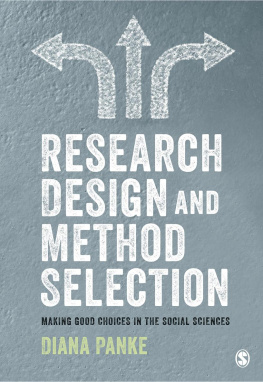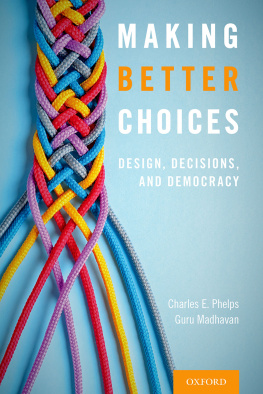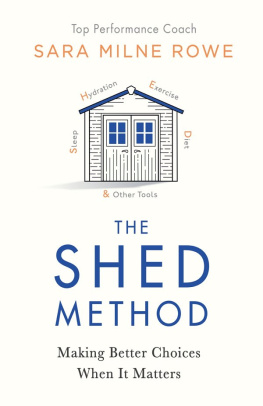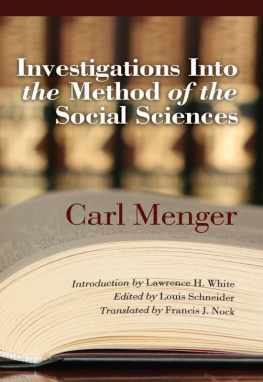Diana Panke 2018
First published 2018
Apart from any fair dealing for the purposes of research or private study, or criticism or review, as permitted under the Copyright, Designs and Patents Act, 1988, this publication may be reproduced, stored or transmitted in any form, or by any means, only with the prior permission in writing of the publishers, or in the case of reprographic reproduction, in accordance with the terms of licences issued by the Copyright Licensing Agency. Enquiries concerning reproduction outside those terms should be sent to the publishers.
SAGE Publications Ltd
1 Olivers Yard
55 City Road
London EC1Y 1SP
SAGE Publications Inc.
2455 Teller Road
Thousand Oaks, California 91320
SAGE Publications India Pvt Ltd
B 1/I 1 Mohan Cooperative Industrial Area
Mathura Road
New Delhi 110 044
SAGE Publications Asia-Pacific Pte Ltd
3 Church Street
#10-04 Samsung Hub
Singapore 049483
Library of Congress Control Number: 2018933185
British Library Cataloguing in Publication data
A catalogue record for this book is available from the British Library
ISBN 978-1-5264-3862-1
ISBN 978-1-5264-3863-8 (pbk)
Editor: Jai Seaman
Assistant Editor: Alysha Owen
Production editor: Imogen Roome
Copyeditor: Aud Scriven
Proofreader: Neil Dowden
Marketing manager: Susheel Gokarakonda
Cover design: Lisa Harper-Wells
Typeset by: C&M Digitals (P) Ltd, Chennai, India
Printed in the UK
About the Author
Diana Pankecurrently is Professor of Political Science and holds the Chair in Multi-Level Governance at the University of Freiburg. Prior to that she worked at University College Dublin, the Free University Berlin, and the University of Heidelberg. She has specialized in international relations, comparative regionalism, and social science research methods. Her research interests include international negotiations, small states in international affairs, multilateral diplomacy, international norms, the design of international institutions, and European Union politics as well as compliance and legalization. In these fields she has published journal articles in a variety of outlets, such as
Review of International Organizations,
International Political Science Review,
European Journal of International Relations,
British Journal of Politics and International Relations,
Comparative Political Studies,
Cooperation and Conflict,
Journal of Common Market Studies,
Journal of European Public Policy,
Journal of European Integration,
International Relations, and
International Politics. Her books have appeared with Palgrave, ECPR Press, Manchester University Press, and Ashgate.
Preface: Aim and Scope of the Textbook
This book provides hands-on advice for graduate students, PhD candidates, postdoctoral researchers, and scholars of the social sciences who are about to decide on the research design of their MA theses, PhD dissertations, postdoctoral projects, or grant applications. It helps to put research ideas into sound research projects.
The book offers step-by-step guidance on how to make choices with respect to the design of scientific research projects as well as how to make choices amongst the methods of data collection and the methods of data analysis. It supplies a roadmap for how to exercise the best judgment at critical crossroads when engaging in setting up scientific projects in the social sciences. The major emphasis is on explanatory research design and method selection. Accordingly, the chapters of this book cover how to develop good research questions and explain the relevance of empirical puzzles (and how to find them). Once a research question is set, the challenge is to answer it in a scientific manner. This requires theoretically and methodologically sound empirical work. Hence, this book teaches you how to work with theories and develop hypotheses, as well as how to decide on the best approach for empirically examining these with quantitative or qualitative methods. To this end, it covers the most prominent methods of data collection as well as quantitative and qualitative methods of data analysis, providing guidelines on how to choose the methodology best suited for your project. Thus, the book sheds light on the challenges that students of the social sciences often face when designing and executing social science research projects and deals with how you can overcome those challenges and navigate the crossroads of choices.
It consists of nine chapters with question-and-answer sections and exercises that allow you to check your progress as you go along. The chapters also provide decision-trees and checklists that will help you turn your research ideas into sound social science research designs.
The book can be used either as a step-by-step guideline in how to set up a social science research project from start to finish, in which case it is recommended you read the book chapter-by-chapter, or as a problem-solving and decision-supporting device. If you are a graduate student, PhD candidate, postdoctoral researcher, or scholar of the social sciences and already familiar with the basic concepts of social science research and the core components of explanatory research design, go straight to the substantive chapters of the book (). Also, if you are struggling with a particular element in designing social research projects jump to the corresponding chapter and obtain an overview of the choices that you can make as well as their respective implications.
is meant for readers who are engaging with social science research for the first time. It provides an overview of the components of research design in the social sciences. It distinguishes between deductive and inductive approaches to constructing a research project, between explanatory and interpretative research designs, as well as between x-centered and y-centered projects. In addition, quality criteria for social science research, such as reliability and validity, are discussed. Each of the subsequent book chapters focuses on a key step that is necessary for developing a sound social science research design.
Since all research projects require a research question, the second chapter discusses quality criteria for good research questions and on this basis explains the choices you will face in the process of deciding which research question to examine in your project. points out that a










